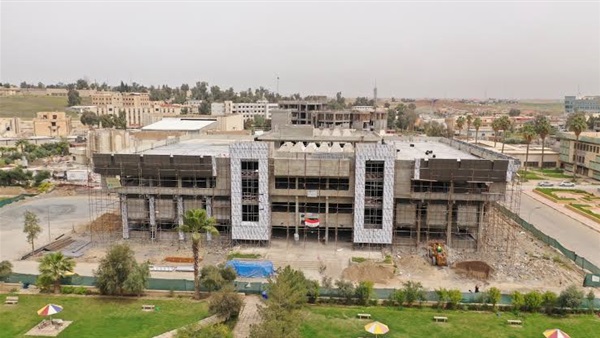‘A symbol of new beginning’: Mosul’s university library reopens

The university library in Mosul, which was bombed by Islamic State militants, has opened its doors again, describing itself as a “lighthouse of knowledge” which is “once again burning bright”.
Founded in 1921, the library was ransacked and bombarded by missiles during the IS occupation of the city, with an estimated 8,000 to 10,000 books and manuscripts destroyed. It was reopened on 19 February by the United Nations Development Programme (UNDP), with financial support from Germany and book donations from around the world, including over 20,000 from the UK.
The university library said the slogan written on the wall by its entrance, “The Word ‘Impossible’ Does Not Exist In Our Dictionary”, was “a symbol of triumph of humanitarianism, civilisation and peace over terrorism”.
“This is an extraordinary moment in the history of our city,” said Dr Sayf Al Ashqar, the university’s secretary general of libraries. “The library’s reopening is not just important to the students – but to all of us who lived through that terrible time. It is a symbol of new beginning and we would like to thank everyone who made it possible.”
More than 20,000 higher education books were provided for the reopening by UK charity Book Aid International, donated by publishers. The charity first began to support the library after it was approached by Mosul University professor and founder of the Mosul Book Bridge project, Dr Alaa Hamdon. ““I have always believed that libraries are lighthouses of knowledge – providing a beacon for those who value learning,” said Hamdon. “IS extinguished that light for a time, but now our lighthouse is once again burning bright. Libraries can only thrive when they are full of inspiring, wonderful books.”
‘I feel free when I run’: the young women enjoying a sense of freedom in Iraq
Book Aid intends to provide thousands of additional new titles to the library in the future. “There are few places in the world which have suffered a more direct attack on learning than Mosul, and we are incredibly proud to have played a small role in restoring the book collection which was destroyed at the University of Mosul library,” said chief executive Alison Tweed.
UNDP resident representative in Iraq, Zena Ali Ahmad, said the reopening was “an important milestone in the journey to revitalising this iconic city”.
“Due to the city’s historical importance and devastating destruction under Isil, UNDP prioritised its stabilisation and rebuilding efforts in Mosul,” said Ahmad. “I am proud that today, the number of students at the University has surpassed enrolment rates before Isil occupation by over 40%. This shows the strength and resilience of the city – one that’s well on its way to recovery after years of conflict.”





